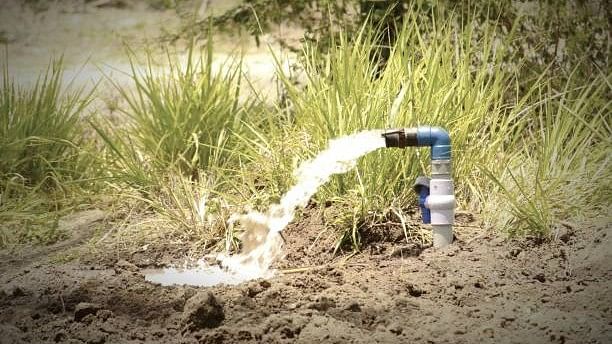
Image for representation.
Credit: iStock Photo
New Delhi: Drawing attention to a shift in water source reliance, experts noted that the Jal Jeevan Mission has significantly reduced dependency on groundwater, moving from an 85 per cent reliance on groundwater and 15 per cent on surface water to a more sustainable balance of 52 per cent groundwater and 48 per cent surface water.
A panel discussion focused on achieving universal access to rural drinking water highlighting the need for innovative approaches and community-driven solutions.
During a session titled "Achieving Universal Access to Drinking Water in Rural Areas" at the India Water Week 2024, Ministry of Housing and Urban Affairs Additional Secretary D. Thara underscored the importance of a unified approach to rural and urban water governance, warning against working in silos that could hinder long-term progress.
She emphasized the role of citizen activism, encouraging the rural communities to actively engage in securing their water needs and driving local solutions for sustainable water management.
National Jal Jeevan Mission (JJM) Additional Secretary and Mission Director Dr Chandra Bhushan Kumar in his presentation traced the evolution of water management both globally and in India before discussing the achievements of the Jal Jeevan Mission.
Drawing attention to a shift in water source reliance, the expert noted that the mission has significantly reduced dependency on groundwater, moving from an 85 per cent reliance on groundwater and 15 per cent on surface water to a more sustainable balance of 52 per cent groundwater and 48 per cent surface water.
He also highlighted the mission's impact on improving the quality of life in rural areas by saving time, improving health outcomes and enhancing the overall well-being.
Uttar Pradesh Government Secretary Dr Raj Shekhar shared the state's milestone of achieving 85% coverage under the Jal Jeevan Mission.
He also discussed the state’s adoption of grievance redressal systems, SCADA (Supervisory Control and Data Acquisition) automation and solar-powered drinking water schemes that are improving rural water access.
From Karnataka, Nagendra Prasad K, Director of the Rural Water Supply and Sanitation Department, shared insights into the state’s focus on sustainability strategies, including reducing dependence on groundwater and mitigating seasonal variations in water availability.
He stressed the need for financial stability through user charges and fund convergence, emphasizing the role of community involvement in maintaining water supply schemes.
The discussion brought forth several key takeaways, particularly the importance of collaborative governance across rural and urban sectors, active community participation and innovative approaches like the use of technology and solar-powered water systems.
The states like Uttar Pradesh and Karnataka have demonstrated successful models in ensuring sustainable water supply, serving as examples for other regions.